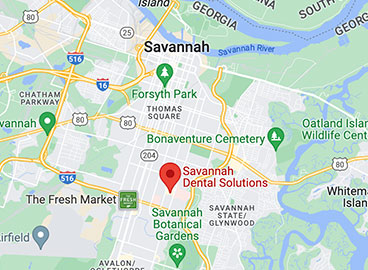We Care About Your Children!
Our care for your children extends to making them feel comfortable during their dental visits with our thoughtful and compassionate service. Our friendly pediatric dental team helps put young patients at ease so they enjoy coming to our kid-friendly dental office. During their regular dental cleanings and preventative care visits, we also teach and encourage them to maintain good oral hygiene every day. We love caring for them and watching them grow year after year.
Calming Dental Fears
Savannah Dental Solutions is a trusted pediatric dental practice that provides children with specialized pediatric dentistry and preventative dental care in a comfortable, family-focused environment. Our experienced pediatric dentists help children develop healthy habits for a lifetime of optimal dental health.
We know that sometimes the reason adults have fear of dental visits is because of an unhappy experience as a child. Our goal is to ensure that this and future generations never develop anxiety about dental care. We achieve this by providing a relaxed, kid-friendly environment where children feel safe and comfortable.
No matter what past experience your child may have had, our pediatric dentist and caring team will help them have a positive experience that encourages lifelong healthy smiles.
Your Children’s Dentist Is as Important as Their Pediatrician
Instilling good dental care habits at an early age helps children maintain strong oral health throughout life. Children’s teeth are more prone to decay for various reasons, often because they don’t brush thoroughly or consistently. We encourage parents to supervise their children’s oral hygiene routines to ensure they develop healthy habits early.
Children often snack throughout the day, which exposes their teeth to acids that can cause decay. If poor oral hygiene or dietary choices are corrected early—and combined with professional preventative care like fluoride varnish—the risk of cavities decreases significantly.
Our pediatric dental practice is committed to guiding families toward lasting oral health through education, prevention, and personalized patient care.
Preventing Child Tooth Decay – The Easy Way!
We understand that children may not brush as well as they should, and even good brushing may not clean all the deep grooves of teeth. Once plaque builds up, decay can develop quickly. Even the smallest amount of decay requires treatment to protect your child’s oral health.
Let us introduce you to a proven method for preventing cavities. With the application of dental sealants on each tooth, the chances of decay are greatly reduced.
Here’s how the sealants are applied:
- After all the teeth are cleaned and sterilized, a thin coating of a transparent varnish is applied to all exposed areas of each tooth. A curing light is used to bond the sealant to the teeth.
- This entire procedure takes just minutes, and no shots or drills are needed. The whole tooth structure remains intact and it is harmless, yet very effective in helping children and adolescents keep their natural teeth for a lifetime!
Childrens Dentistry at Savannah Dental Solutions
What Do Kids Have to Say About the Tooth Fairy?
Pediatric Dentistry FAQs
Schedule the First Step Toward Your Healthiest Smile






